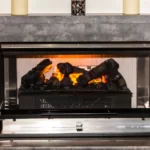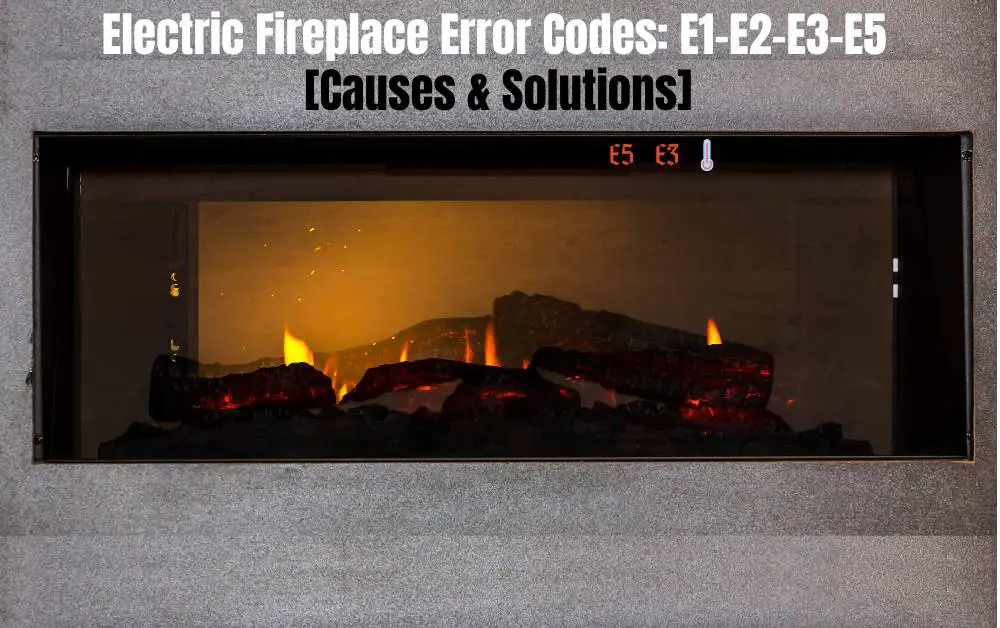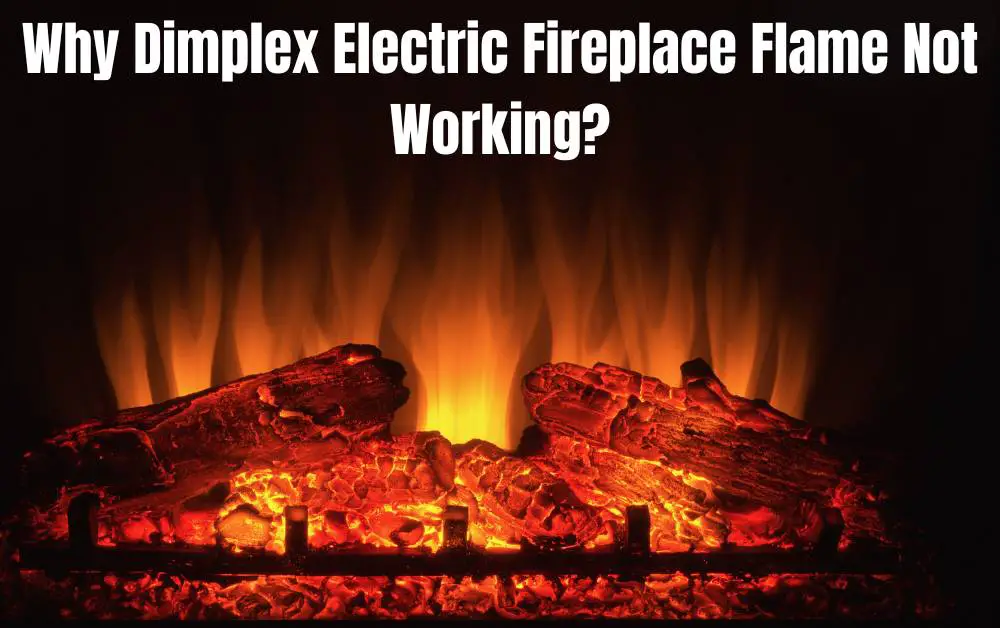Most household owners suddenly notice their electric fireplace turn off multiple times by itself. This problem can be frustrating, especially when you invest a decent amount in bringing an electric fireplace to enjoy the traditional fireplace look and warmth without any smoke or gas leakage problems. Why does my electric fireplace turn off by itself?
Your Electric Fireplace Turn Off by Itself because of:
- Overheating of the Unit.
- Improper Timer & Temperature settings.
- Dirty Heater Elements.
- Circuit Breaker Issues.
- Wires & Power supply Issues.
- Blocked or Restricted Airflow.
- Incorrect Bulbs Installed.
- Internal Defective Parts.
- Fan and blower malfunctioning.
Before You Panic: Is Your Electric Fireplace Really the Problem?
Are you worried about why your electric fireplace turns off by itself? There could be a minor fault that can be addressed at home. However, sometimes there can be a more complicated issue that needs professional help to address the issue.
Understanding why a fireplace shuts off by itself will help to identify the issue and to fix it accordingly.
We have compiled the most common issues that can cause this issue with your heating unit and how you can fix the problems.
Keep Reading!!
Why does my electric fireplace turn off by itself?
The common Reasons that can make your electric fireplace shutting off by itself are:
1) Overheating of the Unit
Electric fireplaces are becoming popular to keep your home warm and cozy while avoiding the hassle of a traditional fireplace.
To keep you safe, many manufacturers include auto overheat detector sensors that prevent your unit from reaching unsafe temperatures.
When these sensors in the central heating system detect extreme heat, your fireplace will shut off automatically to avoid any lasting damage to the unit or any other hazard.
2) Timer Setting
A timer feature on an electric fireplace is a great way to keep your home safe and save energy. With a timer, you can set the fireplace to turn off after a specific time, much like you would use an alarm clock.
If your fireplace seems to be shutting off suddenly, it is important to check the heater unit’s timer settings for its auto-on and off abilities. This way, you can ensure that your electric fireplace is safely running without wasting energy.
3) Temperature Settings
Having a temperature setting feature in your fireplace is an incredibly empowering experience. You get to customize the temperature of most electric fireplaces to your needs and set it for optimal performance.
At any time, if the unit detects that temperatures have become higher than you selected, it will automatically shut off to protect you and your home from overheating.
4) Dusty or Dirty Heater Element
Keeping your heating unit clean and in proper working order can often be overlooked as part of a home maintenance routine.

However, if you fail to regularly maintain your heating unit, the dirty heating element can cause some serious problems.
Dust, debris or foreign object lodged inside the heater can cause it to make odd noises and even force it to turn off unexpectedly.
Not only is this noisy and potentially disruptive, but it could also be hazardous for anyone in the vicinity.
Heating units should be inspected and cleaned regularly to ensure that all these objects are cleared from the interior.
5) Circuit Breaker Issues
A home’s fireplace is warm and inviting, but it can be dangerous if the circuit breaker trips. The fireplace may shut down when this happens, but if it keeps drawing power from the circuit, it could overheat and cause an even larger problem.
To ensure this does not occur, homeowners should check for any tripped breakers in their electric panel before turning on their fireplace.
If one is found, it should be reset, and the fireplace should be monitored closely to ensure it remains operational throughout its use.
6) Faulty Wiring
Even the smallest faults in electric fireplace wiring can cause serious issues, including the unit shutting off entirely. If your fireplace turning on or off by itself, the wiring needs to be examined regularly to ensure that it functions correctly and that all connections are secure.

Poorly installed or damaged wiring may lead to an unsafe situation, so replacing any damaged wiring should be a priority.
It’s important to consider that furnace repairs should only be done by a licensed electrician, given their knowledge and experience in inspecting electrical components.
Taking measures like these will help ensure that your electric fireplace functions properly and safely over time.
7) Blocked or Restricted Airflow
When using a fireplace, it is important to make sure that there is adequate airflow. Easy access for air to circulate will ensure that your fireplace can heat the space efficiently.
If something blocks the fireplace, such as furniture or curtains too close for proper circulation, it may cause the fireplace to turn off randomly.
Blocked heater with restricted airflow can be extremely frustrating, smell like burning plastic and can result in uneven room temperatures or even leave you with no heat!
8) Power Supply Issues
Malfunctioning fireplaces can be a major safety hazard, so it’s important to ensure that a power supply problem isn’t causing it to turn off unexpectedly.
A loose connection or a damaged cord in the fireplace’s power supply can cause these issues, so it’s important to inspect them and make any necessary repairs or replacements.
If neither of those is to blame, other solutions may need to be explored. In any case, keeping up with maintenance and inspections is essential to ensure your fireplace functions properly and safely.
9) Fan malfunctioning
Electric fireplaces are a convenient alternative to traditional and gas fireplaces and can be a great addition to any home. Not only do they heat up quickly, but many models come equipped with fans that allow the warm air to circulate more slowly and evenly.
If the fan of your fireplace not working properly, the fireplace may turn off automatically to prevent excessive heat from accumulating. This helps keep homes safe from potential damage caused by overheating electric fireplaces.
Furthermore, these machines can often be quickly fixed by replacing one small part or upgrading the fan.
10) Incorrect Bulbs

If you’ve recently repaired your electric fireplace, only for it to turn off suddenly by itself, then checking the bulbs of your heating unit is essential.
The wattage input is a critical aspect of each model of electric fireplace, and if the wattage within its bulbs is more than what’s suitable for that appliance, it can result in a sudden shut-off.
Examine your electric fireplace unit’s wattage specifications to ensure you’re using bulbs with the correct wattage.
11) Defective Parts
An electric fireplace can add a touch of elegance and modern convenience to your home, but any defective part such as air filter, blowers and flames burner inside can throw a major wrench into things.
Faulty parts can cause a wide range of issues – from an annoying humming or buzzing noise to the fireplace not operating properly or even suddenly shutting off. In addition to detracting from your ability to relax and enjoy the ambiance of the fireplace, these types of problems could indicate potential safety hazards.
It’s important to address any issues with defective parts as soon as possible, so the situation doesn’t worsen.
What to do if your electric fireplace turns off by itself?
If your electric fireplace turns off by itself, here are some steps you can take to troubleshoot and fix the problem:
- Check for overheating: Overheating is a common cause of electric fireplaces turning off, identify the overheating issue and address accordingly.
- Check the thermostat: If you have an adjustable thermostat, check to ensure it is set at the desired temperature. If it is set too high, it could be causing the fireplace to turn off.
- Check the timer: If your electric fireplace has a timer function, check to see if it has been set and if the timer has run out.
- Check the power source: Make sure there has not been a power outage in your area and that the power cord is securely plugged into the wall.
- Check the circuit breaker: If it tripped, reset it and see if the fireplace turns on. If the circuit breaker trips again, there could be a problem with the electrical wiring.
- Check for blockages: Ensure adequate airflow around the fireplace and that it is not blocked by furniture or curtains.
- Check for faulty components: If you suspect a problem with a component within the electric fireplace, such as the heating element or thermostat, it may need to be replaced.
- Contact a professional: If you cannot diagnose the problem or feel uncomfortable working on the fireplace yourself, it is always best to contact a professional for assistance.

FAQs
Why is My Electric Fireplace Keep Beeping?
If you hear that annoying beeping sound, the batteries in your remote control are getting weak and need to be replaced soon. It’s time to take action and replace those batteries so that you can return to enjoying all the wonderful benefits of having an electric fireplace.
Why Does My Electric Fireplace Blowing Cold Air?

Your electric fireplace can produce cold air if several factors are in play. The manual reset may have tripped, resulting in the fan switch “on” when the thermostat setting is below the actual temperature, blowing this cold air out through its dispersal.
The heater element may also be at fault due to loose wiring or possibly even a defect that needs tending to.
All of these scenarios leave you with that uncomfortable feeling of blowing cold air, but thankfully they’re all detectable and can be easily remedied by an experienced handyman.
Can I repair the thermostat of my electric fireplace myself?
Unless you have experience with electrical repairs, it’s best to consult a professional technician to repair or replace a faulty thermostat.
How often should I clean my electric fireplace?
Aim to clean your electric fireplace at least once every few months, or more frequently if you notice dust accumulation or decreased performance.
Why does my electric fireplace emit a burning smell?
A burning smell from your electric fireplace could indicate dust accumulation on the heating elements or a malfunctioning component. Turn off the unit and contact a technician for inspection and repairs.
Can I leave my electric fireplace on overnight?
While electric fireplaces are generally safer than traditional wood-burning fireplaces, it’s recommended to turn them off when unattended or sleeping to reduce the risk of accidents.
How can I improve the heat output of my electric fireplace?
Ensure proper ventilation around the fireplace, avoid blocking the vents, and consider using a fan to distribute heat more effectively throughout the room.
Affiliate Disclosure: Fireplaceadviser.com is a participant in the Amazon Services LLC Associates Program. We may earn a commission when you click on certain links on this site and purchase.

Hello!! I am Jamal Khan. I often fix my home electric heaters and gas stove problems and research the common issues in the heating units to improve my knowledge and expertise. The aim of establishing fireplaceadviser.com is to share my expertise and knowledge with my audience.












